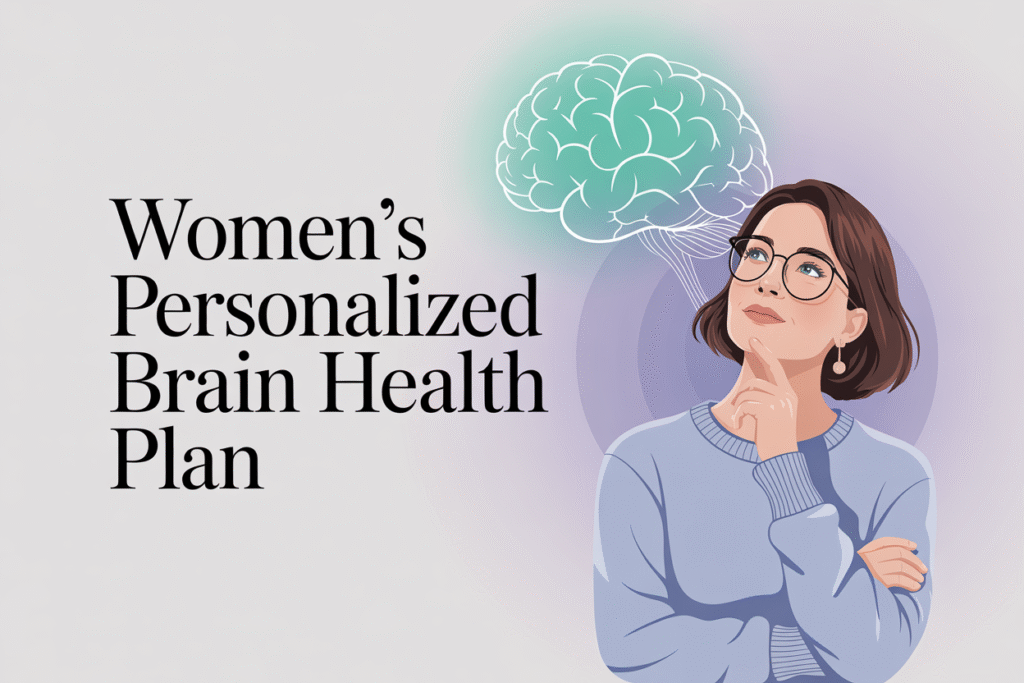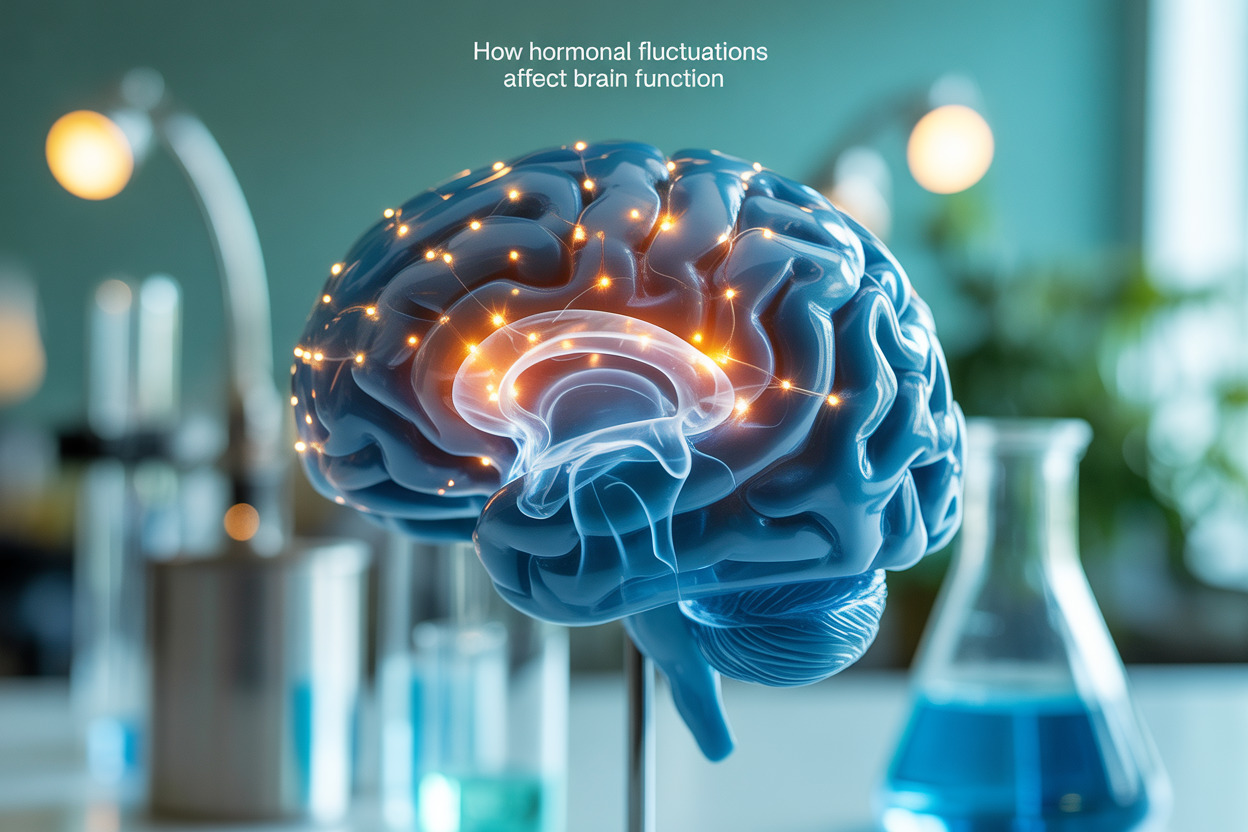How To Protect Cognitive Function Through Midlife
For many women navigating the complex terrain of midlife, cognitive changes can be among the most disconcerting aspects of this transition. The experience is remarkably common: searching for familiar words that suddenly seem just out of reach, struggling to maintain focus during important conversations, or walking into a room only to forget why you entered. These moments—often dismissively labeled as “brain fog” or “senior moments”—can trigger not just frustration but genuine concern about long-term cognitive health.
The statistics tell a compelling story: up to 60% of perimenopausal women report some form of cognitive change during this transition. Such experiences aren’t merely subjective—research using neuropsychological testing confirms measurable changes in specific cognitive domains during perimenopause, particularly in working memory, attention, and verbal processing speed.
Many women don’t realize that these cognitive changes aren’t random or simply age-related—they’re intricately connected to the hormonal fluctuations that characterize perimenopause and menopause. Dr. Pauline Maki, professor of psychiatry and psychology at the University of Illinois at Chicago, explains: “The same hormonal changes that cause hot flashes and mood swings also affect brain regions involved in memory, attention, and executive function. Understanding this connection is the first step toward protecting cognitive health during this transition.”
Fortunately, while hormonal brain changes present real challenges, they respond well to targeted, evidence-based strategies. By understanding the unique neurological shifts that occur during midlife and implementing appropriate interventions, women can not only manage current cognitive symptoms but also build resilience against age-related cognitive decline in the decades ahead.
In this comprehensive guide, we’ll explore the science behind midlife cognitive changes, examine how hormonal fluctuations specifically affect brain function, and provide actionable, research-backed strategies to help you maintain optimal cognitive health during this significant life phase and beyond.
Understanding Midlife Cognitive Changes

How Hormonal Fluctuations Affect Brain Function
To understand why cognitive function changes during midlife, we need to examine how reproductive hormones influence brain structure and function:
Estrogen’s Brain Protection Role
Estrogen doesn’t just affect reproductive function—it significantly impacts brain health through multiple mechanisms. Research published in Frontiers in Neuroendocrinology demonstrates that estrogen:
- Promotes neural growth and formation of new synaptic connections
- Enhances cerebral blood flow, delivering oxygen and nutrients to brain cells
- Protects neurons from damage and stimulates repair mechanisms
- Modulates neurotransmitter systems involved in memory and mood
- Reduces inflammation and oxidative stress in the brain
- Supports mitochondrial function in brain cells
Dr. Roberta Diaz Brinton, director of the Center for Innovation in Brain Science at the University of Arizona, explains: “Estrogen receptors exist throughout the brain, particularly in regions critical for learning, memory, and emotional processing. When estrogen levels fluctuate dramatically during perimenopause, these brain regions experience significant adaptation challenges.”
Your brain essentially loses a key protective factor during this transition, affecting everything from how you process information to how well you remember it.
Progesterone’s Brain Effects
While estrogen often receives the most attention, progesterone also significantly impacts brain function. Research in Psychoneuroendocrinology shows that progesterone:
- Promotes myelination (the insulating sheath around nerve fibers that speeds neural transmission)
- Reduces brain inflammation
- Protects against excitotoxicity (neuronal damage from excessive stimulation)
- Influences GABA activity, affecting stress response and anxiety
As progesterone production becomes erratic and eventually declines during perimenopause, these neuroprotective mechanisms diminish, potentially contributing to cognitive symptoms.
Think of progesterone as your brain’s natural calming agent that gradually decreases during this transition.
The Perimenopause Brain Timing
Contrary to expectations, the most significant cognitive changes often occur not after menopause when hormone levels stabilize at a lower level, but during perimenopause when levels fluctuate unpredictably. Research from the Study of Women’s Health Across the Nation (SWAN) found that women in perimenopause reported more cognitive difficulties than either premenopausal or postmenopausal women, with symptoms often improving somewhat after the menopausal transition completed.
Dr. Miriam Weber, neuropsychologist at the University of Rochester Medical Center, notes: “The brain eventually adapts to consistently low hormone levels after menopause. It’s the roller coaster of fluctuating hormones during perimenopause that creates the most significant cognitive vulnerability.”
This explains why many women report improved cognitive function once they reach postmenopause, even though hormone levels remain low.
Brain Rewiring During Transition
The perimenopausal brain undergoes remarkable adaptation as it responds to changing hormonal signals. Neuroimaging research published in Neurobiology of Aging shows that the brain actually rewires certain neural circuits during this transition, recruiting different regions to accomplish cognitive tasks that previously relied on estrogen-sensitive pathways.
Dr. Lisa Mosconi, director of the Women’s Brain Initiative at Weill Cornell Medicine, explains: “The perimenopausal brain is not a ‘broken’ brain—it’s a brain undergoing an adaptive transition. Understanding this distinction helps us approach cognitive changes not as inevitable decline but as a temporary adjustment period that can be supported with appropriate strategies.”
Dr. Miriam Weber, neuropsychologist at the University of Rochester Medical Center, notes: “The brain eventually adapts to consistently low hormone levels after menopause. It’s the roller coaster of fluctuating hormones during perimenopause that creates the most significant cognitive vulnerability.”
Your brain is essentially creating new pathways and connections to compensate for changing hormonal signals.en improving somewhat after the menopausal transition completed.
Common Cognitive Changes During Midlife
While each woman’s experience is unique, research identifies several distinct cognitive patterns during the menopausal transition:

Working Memory Challenges
Working memory—the ability to hold and manipulate information in mind over short periods—often becomes less efficient during perimenopause. A study in Neurology found that perimenopausal women showed decreased activity in prefrontal brain regions during working memory tasks compared to premenopausal women, with corresponding performance differences.
These changes manifest as:
- Difficulty keeping track of multiple pieces of information simultaneously
- Forgetting what you were about to say in conversation
- Losing track of tasks when interrupted
- Needing to re-read text to comprehend it fully
- Challenges following complex instructions
You might notice these changes when trying to remember a phone number long enough to dial it, or when following a complex recipe with multiple steps.
Verbal Memory Fluctuations
Many women notice changes in verbal memory—the ability to remember words, names, and verbal information. Research in Menopause: The Journal of The North American Menopause Society found that verbal memory performance fluctuated with estrogen levels during perimenopause, with lower performance during periods of greater hormonal variability.
Common experiences include:
- Word-finding difficulties (“tip-of-the-tongue” phenomena)
- Forgetting names of familiar people or places
- Difficulty recalling recently read information
- Needing to use more notes and reminders
- Challenges learning new verbal information
Dr. Weber notes: “Verbal memory changes are often the most noticeable and concerning for women, partly because language is so central to daily functioning and social interaction. However, these changes are typically subtle and don’t interfere with overall intellectual functioning.”
Those frustrating moments when you can’t recall a familiar word or name are typically temporary and don’t reflect a decline in your overall cognitive abilities.
Attention and Focus Changes
Many perimenopausal women report increased distractibility and difficulty sustaining attention. A study in the Journal of Neuroscience found that fluctuating estrogen levels affected dopamine signaling in attention networks, potentially explaining these symptoms.
These changes manifest as:
- Greater susceptibility to distraction
- Difficulty maintaining focus during lengthy tasks
- Needing to re-read or re-listen to information
- Challenges multitasking
- Mental fatigue with complex cognitive demands
Tasks that require sustained concentration, like reading a complex document or following a detailed presentation, may feel more challenging than before.
Processing Speed Variations
Information processing speed—how quickly the brain takes in, interprets, and responds to information—may temporarily slow during perimenopause. Research in Neuropsychology, Development, and Cognition found that processing speed showed greater variability during perimenopause compared to either pre- or postmenopause.
Women often notice:
- Taking longer to complete familiar cognitive tasks
- Needing more time to formulate responses in conversation
- Feeling mentally “slower” than usual
- Requiring additional time to learn new information
- Difficulty keeping up with fast-paced information
Your brain may need a bit more time to process information, particularly in situations with time pressure or when learning something new.
Executive Function Fluctuations
Executive functions—the higher-order cognitive processes that coordinate other brain functions—can become less efficient during perimenopause. A study in Menopause found that executive function performance correlated with estrogen fluctuations, with greater variability during periods of hormonal instability.
These changes affect:
- Planning and organization
- Decision-making, especially with complex choices
- Cognitive flexibility (shifting between tasks or perspectives)
- Self-monitoring and error detection
- Inhibitory control (filtering irrelevant information)
Dr. Maki emphasizes: “Executive function changes during perimenopause are typically subtle and don’t represent a decline in intelligence or capability. Rather, they reflect temporary inefficiencies in neural processing as the brain adapts to changing hormonal signals.”
You might find yourself needing more organizational systems or struggling with decisions that involve weighing multiple factors.
The Bidirectional Relationship Between Cognitive Symptoms and Other Menopausal Experiences
Cognitive changes don’t exist in isolation—they interact bidirectionally with other common menopausal symptoms:

Sleep-Cognition Connection
The relationship between sleep and cognitive function becomes particularly pronounced during perimenopause. Research in Sleep Medicine demonstrates that perimenopausal women with sleep disturbances show greater cognitive difficulties than those without sleep problems, particularly in attention and working memory.
Dr. Hadine Joffe, Executive Director of the Connors Center for Women’s Health at Brigham and Women’s Hospital, explains: “Sleep disruption and cognitive symptoms often form a self-reinforcing cycle during perimenopause. Poor sleep impairs next-day cognitive function, while cognitive inefficiencies can increase anxiety and rumination that further disrupt sleep.”
Those nights of tossing and turning don’t just leave you tired—they directly impact your thinking abilities the next day.
Mood-Cognition Relationship
Anxiety and depression—which increase during perimenopause—directly impact cognitive performance. Research in the Journal of Affective Disorders found that perimenopausal women with elevated anxiety or depression symptoms showed greater cognitive difficulties than those without mood symptoms, even after controlling for sleep quality and vasomotor symptoms.
This connection works through several mechanisms:
- Anxiety consumes working memory resources
- Depression affects motivation and cognitive effort
- Both conditions alter attention allocation
- Stress hormones associated with anxiety affect memory consolidation
- Rumination diverts cognitive resources from other tasks
Your emotional state and your thinking abilities are intimately connected, with each influencing the other.
Hot Flash-Brain Function Link
Hot flashes and night sweats correlate with cognitive performance during perimenopause. A study in Menopause found that women experiencing frequent vasomotor symptoms showed poorer performance on tests of verbal memory and executive function compared to those with fewer symptoms.
Dr. Pauline Maki notes: “The connection between hot flashes and cognition goes beyond sleep disruption. The vascular changes that occur during hot flashes temporarily affect blood flow to the brain, potentially disrupting neural function during these episodes.”
Each hot flash isn’t just uncomfortable—it temporarily alters blood flow patterns in your brain, which can momentarily disrupt cognitive processes.
Long-Term Brain Health Considerations
Beyond the immediate cognitive changes of perimenopause, this transition represents a critical window for long-term brain health:
The Critical Window Theory
Research increasingly supports the “timing hypothesis,” which proposes that the menopausal transition represents a critical window for interventions affecting long-term brain health. A study in Neurology found that women who maintained cognitive engagement and implemented brain-healthy habits during the perimenopausal transition showed better cognitive outcomes decades later compared to those who didn’t.
Dr. Mosconi explains: “The perimenopausal brain is undergoing significant adaptation and rewiring. The strategies implemented during this transition can either support healthy adaptation and build cognitive reserve or potentially allow vulnerability to develop.”
How you support your brain during this transition may influence your cognitive health for decades to come.
Alzheimer’s Risk Factors
Women face higher lifetime risk of Alzheimer’s disease than men, with approximately two-thirds of Alzheimer’s patients being female. Research published in PLOS One demonstrates that this sex difference isn’t explained solely by women’s longer lifespan—suggesting that female-specific biological factors, including the menopausal transition, may contribute to risk.
Dr. Brinton, who studies the connection between menopause and Alzheimer’s risk, notes: “The decline in estrogen during menopause affects the brain’s ability to use glucose as fuel, potentially triggering a cascade of changes that, over decades, may increase vulnerability to Alzheimer’s pathology in susceptible individuals.”
Understanding these connections allows for targeted prevention strategies during this critical window.
Vascular Brain Health
The menopausal transition brings increased risk of vascular changes that can affect brain health. Research in the Journal of the American Heart Association found that women experience accelerated vascular aging during perimenopause, with potential implications for cerebrovascular health and cognitive function.
Dr. Rebecca Thurston, Director of the Women’s Biobehavioral Health Laboratory at the University of Pittsburgh, explains: “The brain is a highly vascular organ, receiving 15-20% of cardiac output. The vascular changes that begin during perimenopause—including endothelial dysfunction and increased arterial stiffness—can affect cognitive function both immediately and cumulatively over time.”
Your brain’s blood vessels undergo significant changes during this transition, affecting how efficiently your brain receives oxygen and nutrients.
Metabolic Brain Changes
The metabolic changes that occur during perimenopause—including increased insulin resistance and changes in body composition—have implications for brain health. Research in Diabetes Care demonstrates that insulin resistance affects cognitive function even before diabetes develops, with particular impact on memory and executive function.
Dr. Brinton’s research shows that these metabolic shifts affect how the brain produces energy: “As estrogen declines, the female brain gradually shifts from primarily using glucose as fuel to increasingly relying on ketone bodies. This metabolic adaptation, while natural, creates a vulnerable transition period that can be supported through specific nutritional and lifestyle strategies.”
Your brain’s energy production systems undergo significant remodeling during this transition, creating both challenges and opportunities for intervention.
Evidence-Based Strategies for Cognitive Health
Nutrition Approaches for Brain Protection
Research consistently demonstrates that dietary patterns significantly influence cognitive health during midlife and beyond:

MIND Diet Benefits
The Mediterranean-DASH Intervention for Neurodegenerative Delay (MIND) Diet combines elements of the Mediterranean and DASH diets with specific brain-healthy foods. A study in Alzheimer’s & Dementia found that women with high adherence to the MIND diet had cognitive function equivalent to women 7.5 years younger.
Key components include:
- Green leafy vegetables (6+ servings weekly)
- Other vegetables (1+ serving daily)
- Berries (2+ servings weekly)
- Nuts (5+ servings weekly)
- Olive oil as primary fat
- Whole grains (3+ servings daily)
- Fish (1+ serving weekly)
- Beans (3+ servings weekly)
- Poultry (2+ servings weekly)
- Limited red meat, butter, cheese, pastries, and fried foods
Dr. Martha Clare Morris, creator of the MIND diet, explains: “This eating pattern specifically targets brain health by combining foods rich in neuroprotective compounds while limiting those that promote inflammation and oxidative stress.”
This eating pattern provides your brain with the specific nutrients it needs during this critical transition period.
Anti-Inflammatory Foods
Inflammation increases during the menopausal transition and contributes to cognitive symptoms. Research in the Journal of the Academy of Nutrition and Dietetics found that women following anti-inflammatory dietary patterns experienced fewer cognitive complaints during perimenopause than those consuming pro-inflammatory diets.
Brain-protective anti-inflammatory foods include:
- Fatty fish rich in omega-3s (salmon, sardines, mackerel)
- Colorful fruits and vegetables (berries, leafy greens, orange/red produce)
- Herbs and spices (turmeric, ginger, rosemary, cinnamon)
- Tea (particularly green tea)
- Dark chocolate (70%+ cacao)
- Nuts and seeds
Dr. Lisa Mosconi advises: “Think of anti-inflammatory foods as your brain’s protection system during a time when its natural defenses are changing. These foods provide compounds that help maintain neural connections and support new learning even as hormones fluctuate.”
Reducing inflammation through diet helps counteract the pro-inflammatory state that often accompanies the menopausal transition.
Blood Sugar Stability
Glucose metabolism changes during perimenopause affect cognitive function. Research in Neurology found that women with better glucose regulation showed stronger cognitive performance during and after the menopausal transition compared to those with greater glucose variability.
Strategies for blood sugar stability include:
- Pairing carbohydrates with protein, fiber, or healthy fats
- Choosing low-glycemic carbohydrate sources
- Eating regular meals to prevent significant blood sugar drops
- Including protein with breakfast
- Limiting refined carbohydrates and added sugars
- Considering intermittent fasting approaches (with medical guidance)
Dr. Dale Bredesen, neurologist and author of “The End of Alzheimer’s,” notes: “Blood sugar stability is crucial for cognitive health during perimenopause. Each blood sugar spike and crash affects brain function both immediately and cumulatively over time.”
Keeping your blood sugar steady helps provide your brain with consistent energy throughout the day.
Brain-Specific Nutrients
Several nutrients show particular importance for cognitive function during the menopausal transition:
- Omega-3 Fatty Acids: These essential fats support neural membrane health and reduce inflammation. A study in The American Journal of Clinical Nutrition found that perimenopausal women with higher omega-3 intake showed better cognitive performance and less decline over time. Sources include fatty fish, walnuts, flaxseeds, and chia seeds.
- Choline: This nutrient supports neurotransmitter production and becomes increasingly important during estrogen decline. Research in Nutrients demonstrates that higher choline intake correlates with better cognitive performance in postmenopausal women. Sources include eggs, liver, soybeans, and cruciferous vegetables.
- B Vitamins: These vitamins support energy metabolism in brain cells and help regulate homocysteine, a compound that can damage blood vessels when elevated. A study in Proceedings of the National Academy of Sciences found that B vitamin supplementation slowed brain atrophy in older adults with elevated homocysteine. Sources include leafy greens, legumes, nutritional yeast, and whole grains.
- Antioxidants: Compounds like vitamin E, vitamin C, and flavonoids protect brain cells from oxidative damage. Research in the Journal of Alzheimer’s Disease found that women with higher antioxidant intake showed better cognitive performance during and after the menopausal transition. Sources include colorful fruits and vegetables, nuts, seeds, and herbs.
Dr. Georgia Ede, psychiatrist specializing in nutritional approaches to brain health, emphasizes: “During perimenopause, the brain’s nutritional needs change. Ensuring adequate intake of these specific nutrients helps support the brain’s adaptation to changing hormonal signals.”
These nutrients provide your brain with the building blocks it needs to maintain and create new connections during this transition.d night sweats. Water, herbal teas, and water-rich foods all contribute to hydration status.”
Physical Activity for Cognitive Protection
Exercise consistently emerges as one of the most powerful interventions for cognitive health during midlife:
Aerobic Exercise Benefits

Regular aerobic exercise improves blood flow to the brain and stimulates the production of growth factors that support neural health. A study in Neurology found that women who engaged in regular aerobic exercise during midlife showed 30% better cognitive performance and lower risk of later cognitive decline compared to sedentary women.
Dr. Kirk Erickson, professor of psychology at the University of Pittsburgh, explains: “Aerobic exercise increases brain-derived neurotrophic factor (BDNF), a protein that acts like fertilizer for brain cells, promoting growth and connectivity. This becomes particularly important during perimenopause when the brain’s estrogen-related growth signals are changing.”
Effective approaches include:
- Moderate-intensity activities like brisk walking, swimming, or cycling
- Aiming for 150+ minutes weekly (about 30 minutes, 5 days per week)
- Finding activities you genuinely enjoy to promote consistency
- Gradually increasing duration and intensity as fitness improves
- Incorporating outdoor exercise when possible (combining physical activity with nature exposure)
Even modest increases in aerobic activity can yield significant cognitive benefits during this transition.
Resistance Training Importance
While aerobic exercise often receives the most attention, resistance training shows specific benefits for cognitive function. Research in the Journal of the American Geriatrics Society found that women who performed resistance training twice weekly showed better executive function and memory compared to those doing only aerobic exercise or remaining sedentary.
Benefits include:
- Improved insulin sensitivity, supporting brain glucose metabolism
- Increased production of growth factors that support neural health
- Enhanced blood flow regulation
- Reduced inflammation
- Improved sleep quality, indirectly supporting cognitive function
Dr. Teresa Liu-Ambrose, professor of physical therapy at the University of British Columbia, advises: “Resistance training doesn’t need to be complicated or gym-based. Body weight exercises, resistance bands, or household items can provide effective resistance for building and maintaining muscle, with corresponding brain benefits.”
Adding strength training to your routine provides unique cognitive benefits beyond what aerobic exercise alone can offer.
Movement Pattern Variety
Diverse movement patterns create more complex neural stimulation than repetitive exercise. Research in the Journal of Aging and Physical Activity found that women engaging in varied movement patterns (combining different exercise types) showed better cognitive flexibility and processing speed than those performing only one type of exercise.
Beneficial approaches include:
- Dance or choreographed fitness classes
- Racquet sports or team activities
- Tai chi, yoga, or martial arts
- Circuit training combining different movement patterns
- Balance and coordination challenges
Dr. Wendy Suzuki, professor of neural science at New York University, notes: “Novel movement patterns create new neural connections and strengthen existing ones. During perimenopause, when the brain is already adapting to hormonal changes, diverse movement provides additional beneficial stimulation.”
Challenging your brain with new movement patterns helps build cognitive resilience during this transition.
Exercise Timing Considerations
When you exercise may be as important as what type you do. Research in the Journal of Physiology found that morning exercise particularly benefited executive function and attention in midlife women, while afternoon exercise showed stronger effects on memory.
Dr. Karyn Esser, professor at the University of Florida’s Center for Exercise Science, explains: “Exercise timing affects how the body responds hormonally and metabolically to physical activity. During perimenopause, when hormonal patterns are already changing, strategic exercise timing can help optimize cognitive benefits.”
Consider experimenting with different exercise timing to find what works best for your body and brain during this transition.
Sleep Optimization for Cognitive Function
Given the bidirectional relationship between sleep and cognition, addressing sleep disruption becomes essential:
Sleep Environment Improvements

Creating ideal conditions for sleep significantly impacts cognitive function. Research in Sleep Medicine found that environmental optimization improved both sleep quality and next-day cognitive performance in perimenopausal women.
Key strategies include:
- Maintaining cool bedroom temperature (65-67°F/18-19°C)
- Ensuring complete darkness or using a sleep mask
- Minimizing noise or using white noise if needed
- Investing in a comfortable, supportive mattress and pillows
- Removing electronic devices from the bedroom
Dr. Michael Breus, clinical psychologist and sleep specialist, advises: “Your sleep environment becomes even more important during perimenopause, when sleep is more vulnerable to disruption. Creating optimal conditions helps compensate for the hormonal changes affecting sleep architecture.”
These environmental adjustments help support your brain’s overnight recovery and memory consolidation processes.
Circadian Rhythm Support
Maintaining consistent sleep-wake patterns supports cognitive function. A study in the Journal of Clinical Endocrinology & Metabolism found that circadian rhythm stabilization improved attention, working memory, and executive function in midlife women, even without changing sleep duration.
Effective approaches include:
- Going to bed and waking at consistent times (even on weekends)
- Getting morning sunlight exposure within an hour of waking
- Limiting blue light exposure in the evening (using apps, glasses, or device settings)
- Creating consistent pre-sleep and morning routines
- Timing meals to support circadian rhythms (earlier dinner, avoiding late-night eating)
Dr. Phyllis Zee, chief of sleep medicine at Northwestern University, notes: “The circadian system becomes more vulnerable to disruption during perimenopause. Consistent patterns help stabilize these rhythms, supporting both sleep quality and daytime cognitive function.”
Your body’s internal clock becomes more sensitive to disruption during perimenopause, making consistency even more important than in earlier life stages.
Cognitive-Behavioral Approaches
Cognitive-behavioral therapy for insomnia (CBT-I) shows particular promise for addressing perimenopausal sleep disruption. A randomized controlled trial in Sleep found that CBT-I improved both sleep quality and cognitive performance in perimenopausal women with insomnia.
Key components include:
- Sleep restriction (temporarily limiting time in bed to build sleep pressure)
- Stimulus control (using bed only for sleep and intimacy)
- Cognitive restructuring (addressing unhelpful thoughts about sleep)
- Relaxation training
- Sleep hygiene education
Dr. Shelby Harris, clinical psychologist and author of “The Women’s Guide to Overcoming Insomnia,” emphasizes: “CBT-I is particularly valuable during perimenopause because it addresses the psychological aspects of sleep disruption that often develop during this transition, breaking the cycle of sleep anxiety that can compound hormonal sleep challenges.”
These psychological approaches help break the cycle of sleep disruption and worry that often develops during perimenopause.
Night Sweat Management
For women whose sleep disruption stems primarily from night sweats, targeted strategies include:
- Layered, moisture-wicking bedding and sleepwear
- Cooling mattress technology or toppers
- Keeping a “comfort kit” beside the bed with items like extra pillowcase, small towel, and cool water
- Bedroom temperature optimization (cooler than typical recommendations)
- Avoiding triggers like alcohol, spicy foods, and caffeine
Dr. Hadine Joffe notes: “Night sweats significantly disrupt the sleep stages critical for cognitive function and memory consolidation. Managing these symptoms effectively can substantially improve both sleep quality and next-day cognitive performance.”
These practical approaches can significantly reduce the sleep disruption caused by night sweats, supporting better cognitive function.
Stress Management and Brain Health
The mind-body connection becomes particularly important during midlife, as stress significantly impacts cognitive function:
Mindfulness Meditation Benefits
Regular mindfulness practice reduces stress hormones and improves attention. A randomized controlled trial in Psychoneuroendocrinology found that an 8-week mindfulness program improved working memory and executive function in perimenopausal women while reducing stress-related cognitive symptoms.
Dr. Sara Lazar, neuroscientist at Massachusetts General Hospital, explains: “Mindfulness meditation actually changes brain structure and function in regions involved in attention, emotional regulation, and self-awareness—all areas affected by hormonal fluctuations during perimenopause.”
Effective approaches include:
- Starting with brief sessions (5-10 minutes) and gradually increasing
- Using guided meditations specifically designed for beginners
- Practicing consistently rather than sporadically
- Incorporating informal mindfulness into daily activities
- Joining classes or groups for support and guidance
Even brief daily mindfulness practice can yield significant cognitive benefits during this transition.
Cognitive Challenge Engagement
Mentally stimulating activities build cognitive reserve—the brain’s resilience against decline. Research in JAMA Psychiatry found that women who regularly engaged in cognitively challenging activities during midlife showed better cognitive function and lower risk of later cognitive decline.
Beneficial activities include:
- Learning new skills or languages
- Engaging in complex leisure activities (chess, musical instruments, art)
- Participating in discussion groups or book clubs
- Taking courses or workshops in unfamiliar subjects
- Solving puzzles and brain games
Dr. Yaakov Stern, professor of neuropsychology at Columbia University, notes: “Cognitive challenge helps build alternative neural pathways and connections. During perimenopause, when the brain is already adapting to hormonal changes, these activities provide additional beneficial stimulation.”
Challenging your brain with new learning helps build cognitive resilience during this transition.
Social Connection Importance
Social engagement provides complex cognitive stimulation while reducing stress. A study in The Journals of Gerontology found that women with stronger social networks and regular social interaction showed better cognitive performance during and after the menopausal transition compared to more socially isolated women.
Dr. Emily Rogalski, associate professor at Northwestern University’s Cognitive Neurology and Alzheimer’s Disease Center, explains: “Social interaction is cognitively complex, requiring attention, memory, language processing, and emotional regulation simultaneously. This multi-domain stimulation provides particularly valuable brain exercise.”
Meaningful social connections help protect your brain during this transition while providing emotional support for navigating changes.
Nature Exposure Benefits
Spending time in natural environments reduces stress hormones and improves cognitive function. Research in Environmental Health and Preventive Medicine found that just 20 minutes in nature significantly reduced cortisol levels and improved working memory performance in midlife women.
Dr. Marc Berman, environmental psychologist at the University of Chicago, notes: “Nature exposure allows the brain’s directed attention systems to recover from fatigue while providing gentle, restorative stimulation. This becomes particularly valuable during perimenopause when cognitive resources may be more limited.”
Regular time in natural settings helps restore your brain’s attention systems while reducing stress hormones that can impair cognitive function.
Hormone Therapy Considerations
Hormone Considerations for Brain Health
For some women, addressing the hormonal underpinnings of cognitive symptoms provides significant relief:
Hormone Therapy Considerations
Research on hormone therapy (HT) and cognition shows mixed results, with timing appearing crucial. The Women’s Health Initiative Memory Study found that women who began hormone therapy within 5 years of menopause showed cognitive benefits or neutral effects, while those starting later showed potential adverse effects.
Dr. JoAnn Pinkerton, Executive Director of the North American Menopause Society, explains: “The ‘critical window hypothesis’ suggests that estrogen may be beneficial for cognitive function when initiated during perimenopause or early postmenopause, but not when started years after menopause when brain adaptation has already occurred.”
Key considerations include:
- Individual risk factors and medical history
- Symptom severity and impact on quality of life
- Timing in relation to menopause
- Type and route of hormone therapy
- Duration of treatment
For women experiencing significant cognitive symptoms during perimenopause, discussing hormone therapy options with a knowledgeable healthcare provider may be worthwhile.
Phytoestrogen Approaches
Plant compounds with mild estrogenic activity show mixed but promising results for cognitive symptoms. A systematic review in Menopause found that isoflavone supplements (40-80mg daily) modestly improved cognitive performance in perimenopausal and early postmenopausal women compared to placebo.
Food sources to consider include:
- Traditional soy foods (edamame, tempeh, tofu)
- Flaxseeds (2 tablespoons daily provides lignans with mild estrogenic activity)
- Red clover (often taken as a supplement)
Dr. Tori Hudson, naturopathic physician and women’s health expert, advises: “While phytoestrogens don’t provide the same potency as pharmaceutical hormone therapy, they offer a gentler option that helps some women navigate cognitive symptoms during perimenopause, particularly when combined with other brain-supporting strategies.”
These natural approaches may be particularly suitable for women with mild symptoms or those who prefer to avoid pharmaceutical options.
Targeted Supplements for Cognitive Support
Several supplements show evidence for supporting cognitive function during hormonal transitions:
- Phosphatidylserine: This phospholipid supports cell membrane function in the brain. Research in the Journal of Clinical Biochemistry and Nutrition found that phosphatidylserine supplementation (300mg daily) improved memory and cognitive function in middle-aged women.
- Bacopa Monnieri: This herb enhances several aspects of cognitive function. A study in Psychopharmacology found that bacopa supplementation (300-600mg daily of extract standardized to 50% bacosides) improved information processing and memory in adults with age-associated memory impairment.
- Lion’s Mane Mushroom: This fungus stimulates nerve growth factor production. Research in Phytotherapy Research found that lion’s mane supplementation (3g daily) improved cognitive function in adults with mild cognitive impairment.
- Ginkgo Biloba: This herb improves cerebral blood flow and has antioxidant properties. A meta-analysis in Psychopharmacology found that ginkgo (120-240mg daily of standardized extract) modestly improved cognitive performance in healthy adults, with stronger effects in those over 50.
Dr. Aviva Romm, integrative physician and author of “Hormone Intelligence,” emphasizes: “While supplements can provide valuable support, they work best as part of a comprehensive approach that includes nutrition, exercise, stress management, and appropriate medical care when needed.”
Consider working with a healthcare provider knowledgeable about supplements to develop a personalized approach.
Creating Your Personalized Brain Health Plan
Assessing Your Unique Cognitive Pattern
Understanding your unique cognitive symptoms helps target interventions effectively:

Symptom Tracking Insights
Keeping a cognitive symptom diary for 2-3 weeks provides valuable insights into your specific patterns. Research in the Journal of Women’s Health demonstrates that symptom tracking often reveals patterns not obvious to the individual. Track:
- Types of cognitive difficulties (word-finding, focus, memory, etc.)
- Time of day when symptoms occur
- Relation to sleep quality the previous night
- Connection to stress levels or emotional state
- Association with other menopausal symptoms
- Potential triggers (certain foods, activities, situations)
Dr. Miriam Weber advises: “Cognitive symptoms often follow patterns that, once identified, can be more effectively addressed. For example, many women discover their word-finding difficulties increase after poor sleep or during periods of high stress—information that helps prioritize interventions.”
This personalized data helps you identify your specific cognitive challenges and their potential triggers.
Cognitive Strengths Assessment
Identifying your cognitive strengths helps build compensatory strategies. A study in Psychology and Aging found that women who leveraged their cognitive strengths to compensate for perimenopause-related changes reported better functional outcomes and less distress about cognitive symptoms.
Dr. Pauline Maki suggests: “Rather than focusing exclusively on cognitive challenges, identify areas of continued strength. This balanced perspective reduces anxiety about cognitive changes while providing a foundation for effective compensatory strategies.”
Understanding your cognitive strengths helps you develop workarounds for areas that are temporarily more challenging.
Professional Assessment When Needed
While most perimenopausal cognitive changes are normal and temporary, certain situations warrant professional evaluation:
- Symptoms that significantly interfere with daily functioning
- Cognitive changes that worsen rather than fluctuate
- Symptoms accompanied by other neurological signs
- Strong family history of early-onset dementia
- Cognitive changes causing significant distress or anxiety
Dr. Pauline Maki emphasizes: “Most perimenopausal cognitive changes are subtle and don’t require formal evaluation. However, if symptoms are causing significant functional impairment or emotional distress, neuropsychological assessment can provide valuable insights and peace of mind.”
Professional assessment can help distinguish normal perimenopausal cognitive changes from other conditions requiring specific treatment.
Layering Solutions for Maximum Benefit
Rather than seeking a single “magic bullet” solution, research supports combining multiple approaches for synergistic effects:
Foundation Practices
Start with fundamental brain-supporting practices that benefit virtually everyone:
- Prioritizing 7-8 hours of quality sleep
- Following a Mediterranean or MIND dietary pattern
- Engaging in regular physical activity
- Managing stress through mindfulness or other techniques
- Maintaining social connections
- Challenging your brain with new learning
Dr. Lisa Mosconi notes: “These foundation practices create the conditions for better cognitive function regardless of your specific symptoms. Think of them as preparing fertile soil in which more targeted interventions can take root.”
These approaches address multiple aspects of brain health simultaneously and often provide some benefit within weeks of implementation.
Targeted Interventions
Add specific interventions based on your predominant cognitive symptoms:
- Word-finding difficulties: Verbal fluency exercises, adequate sleep, stress reduction
- Attention problems: Mindfulness training, nature exposure, reduced multitasking
- For working memory challenges: Memory techniques, adequate protein intake, resistance exercise
- For processing speed issues: Aerobic exercise, omega-3 fatty acids, cognitive training games
Dr. Sandra Bond Chapman, founder and chief director of the Center for BrainHealth, advises: “The most effective approach for perimenopausal cognitive symptoms typically combines lifestyle foundations with targeted interventions specific to your predominant symptoms.”
This layered approach addresses both the general brain vulnerability created by hormonal fluctuations and your specific cognitive challenges.
Consistency and Patience
Brain changes take time, requiring consistent implementation of strategies. Research in Neurobiology of Aging demonstrates that neural adaptation typically requires 8-12 weeks of consistent intervention before subjective improvements become noticeable.
Dr. Wendy Suzuki emphasizes: “The brain changes gradually in response to consistent inputs. During perimenopause, when the brain is already adapting to hormonal changes, patience becomes particularly important as you implement supportive strategies.”
Giving your brain time to respond to new supportive practices yields the greatest benefits during this transition.
Conclusion: Embracing Brain Health in Midlife and Beyond
The cognitive changes that often accompany perimenopause and menopause represent not just challenges but opportunities to develop brain-healthy practices that will serve you well for decades to come. By understanding the complex interplay of hormonal, physical, and psychological factors influencing your cognitive function, you can implement targeted strategies to support brain health during this transition and beyond.
Remember that improving cognitive function during midlife often requires a multifaceted, personalized approach. What works for one woman may not work for another, and what works during one phase of the menopausal transition may need adjustment as hormonal patterns change. Patience, persistence, and willingness to experiment with different approaches will serve you well on this journey.
Perhaps most importantly, recognize that cognitive changes during this transition aren’t something you simply have to endure as an inevitable part of aging. With the right strategies and support, most women can significantly improve their cognitive function during perimenopause and menopause, supporting overall health, productivity, emotional wellbeing, and quality of life during this significant life phase.
Your brain health matters—not just for how you function today, but for your long-term cognitive vitality. By prioritizing brain health and implementing evidence-based strategies tailored to your specific needs, you’re making an investment that will pay dividends in every aspect of your midlife wellbeing and beyond. Be sure to check out some of our recipes that helps to boost your brain power and energy!

